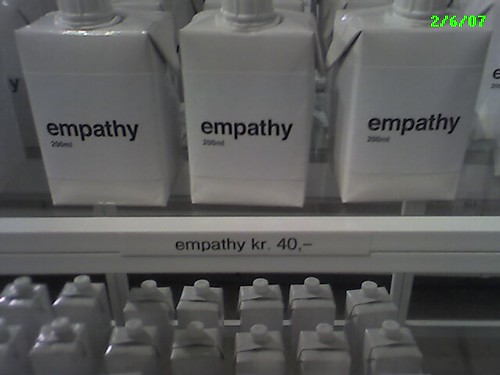With whom do you empathize the most? And how hard do you try to empathize with others?

(Have you taken your dose of empathy today? “Empathy in a carton,” by Geoff Jones, on Flickr under Creative Commons.)
I thought about empathy as I was watching the video of the NYPD takedown of Eric Garner. Mr. Garner was approached by and ultimately tackled by several policemen, which unfortunately resulted in his death.
As I watched, I tried to put myself in each person’s position to try to determine, if I had been them, what I might have been thinking and feeling at the time and whether I would have been able to act any differently. If I had been the first officer, would I have felt threatened when Mr. Garner started waving his arms around? If I had been the officer who approached Mr. Garner from behind, or any of the other officers, would I have felt that I had to resort to dangerous tactics due to his size advantage?
And, at the heart of the matter: if I had been Mr. Garner, would I have felt threatened by the officers present? Would I have thought it somewhat ridiculous that I was being harassed when the only danger I posed was that a few more people would risk slow death from cancer and some fewer dollars would make it into the city coffers, when those officers could be chasing violent felons who posed much greater threats to society? When I turned away from the first officer, would I have been thinking that my best course of action was to try to escape? When so many of them piled on me, would I have struggled to break free simply out of fear for my life?
I went through a similar exercise while reading the grand jury proceedings and looking at the crime scene photographs from Ferguson, regarding the Michael Brown case. Again, I tried to put myself in each person’s position.
If I had been __, would I have felt threatened? Would I have felt afraid? Would I have found it irritating or even maddening to be looked at, spoken to, or approached the way the other person did? Would I have felt within my rights to respond aggressively? Would I have had the self-control to stop before things went too far?
If you haven’t done so, try that exercise yourself. First put one party in the blank, and then the other. Do you come up with the same, or different, answers each time? And, more to the point of this post: do you find it easier to empathize with one party than with the other?
I think it’s human nature for us to find it easier to empathize with people with whom we share common bonds or common characteristics. Someone you know is easier to identify with than a stranger, and someone who is like you in some way is easier to identify with than someone who is very different from you.
But sometimes what is easy is not worthwhile, and what is difficult is most beneficial. Human nature aside, it seems important to go through the effort of trying to empathize to at least some degree with each party whenever we encounter a controversy or a tragedy — at the very least, it seems necessary to developing a fuller understanding of the issue, if not of the world. Failing to do so is not a vice, because it can be quite daunting, but refusing to make the attempt is no virtue.








